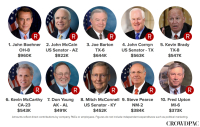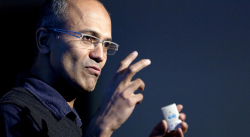
I was getting ready to graduate from Northwestern, and would spend the next several months, mostly unemployed, back home in Houston, the capital of oil, before getting the job resulting in the picture to the right. People were becoming accustomed to the strange man in the White House and his scandals. His “Georgia Gang” of cronies was being derided as a political gang that couldn’t shoot straight.
But beneath the surface, economic change was brewing. Oil had been handed political power under Lyndon Johnson and found a ready embrace in the Nixon years thanks to former Governor John Connally, whose decision to switch sides seemed at the time like a small story but would later prove massive.
Oil didn’t want to become a Republican bulwark. They wanted to play both sides against each other. Carter, and his more liberal detractors, forced them into the Republican camp. During the 1978 campaign, and beyond, this would prove decisive.
We’re at a similar historical junction now. Washington is becoming accustomed to a strange man in the White House, and his scandals. His “Wall Street Gang” is being derided as a political gang that can’t shoot straight.
But beneath the surface, change is again brewing.

Carter also had business allies. We forget, or ignore, how manufacturers and the Business Roundtable accommodated themselves to him. It was their destruction, a product of the 1979 oil crisis, that would prove decisive in the politics of my time.
This is the way it is, the way it always has been with America. Business drives the train. The industries driving change always get the lion’s share of profit, the best growth charts, and once they’re defied, their political choices force Washington into a new balance. Until, that is, a new industry rises.
It has been that way since 1791. “When you got skin in the game, you stay in the game, but you don’t get a win unless you play in the game.”
Technology knows it must now be in the room where it happens, and it has a winning hand.

The pattern repeats because business, in its never-ending search for higher profits, keeps finding them, and it is profit that pushes society forward.
What business needs from society, however, changes as different industries take the stage. Oil was a mercantilist business. Control over the resource meant control over pricing and the resource’s allocation. This drove policy from the Reagan era onward. Rather than being pushed by the Middle East’s oil powers, we became involved in its wars, choosing who would win and who would lose through force of arms.

The American economy today is built on the cloud. Five companies, between them, represent nearly $4 trillion in market cap. I call them the Cloud Czars – Apple, Amazon, Google, Microsoft, and Facebook. They have three times more value than the 10 largest oil companies in the world. And that’s not counting all the other huge, growing tech companies that either use or supply the cloud – Nvidia, Salesforce.com, etc. etc.

What it can’t deal with is Alibaba, Tencent, ZTE, Huawei, and Tsinghua. Amazon needs America and the West to remain economically strong. They need us to remain attractive to intellectual capital if they’re to win against Chinese competition. This isn’t a war, or even a trade war. It’s a battle for markets, a battle both sides can win, but only if it’s understood as such, and only if both sides are fighting it.

It’s an ace the Trump Administration is throwing aside. Trump’s policies against education, his policies against immigration, and his idiocy of thinking that you must borrow against a trade deficit are deeply threatening to the Cloud Czars. Combine those policies with the growth of the Chinese giants and you have an existential threat.
It is this economic reality, and nothing else, that will drive the politics of my children’s generation.
Jeff Bezos is taking the lead because he sees all this clearly and because his company is American. He’s also the world’s wealthiest man, a lead he extends every day. But he won’t be alone in this. Larry Page and Sergey Brin, between them, have over $90 billion at stake in this game. Bill Gates has an equal amount at stake and carries the proxy of Warren Buffett’s $80 billion. Tim Cook, as a gay man, feels directly threatened by Trumpism, and while Mark Zuckerberg thinks he can play both sides his company still isn’t in China, and won’t be any time soon.
That’s economic power. That’s decisive. Today it’s an iceberg, 90% of it hidden under the surface while Trump fights to push oil prices up and give more power to his Texas oil and Wall Street friends. But economic power has shifted from the east coast and the gulf coast to the west coast, and political power will inevitably follow.
I, for one, welcome our new tech overlords.










